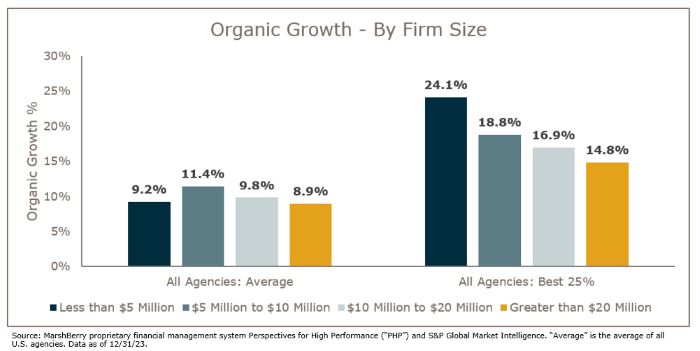There’s power in numbers, particularly when those numbers are facing the same challenges, have similar goals, and seek the same success. An executive peer exchange is a proven way to find support and build networks that are mutually beneficial. Top peer exchanges offer these beneficial advantages:
- Data-driven insights: Firms that leverage data benchmarking, advanced analytic tools and engagement assessments are better equipped to challenge business practices, drive strategic decisions, and achieve intentional growth. In fact, the top 25% of firms participating in MarshBerry’s Connect executive peer exchange membership see almost 2/3 more organic growth than an average firm not investing in a peer group and applying learned best practices.

- Exclusive resources: Webinars, human resource templates, industry studies, research reports, and a first look at new products and services all offer the opportunity to access the leading edge of innovative solutions.
- Professional relationships: Participants from similar firms connect to motivate, inform, and present new perspectives with their colleagues.
Relationships created in an executive peer exchange are incredibly valuable and should go beyond basic networking. Successful peer exchanges organize members into smaller cohorts, what MarshBerry calls Strategic Issues Groups (SIGs). These small groups of executives provide each other with individual coaching, ongoing support and collaboration, problem-solving, and most importantly, accountability.
Like-minded partners and experts
Executive peer exchanges with cohorts offer a more intimate and insightful experience. Best peer cohorts include firms with similarities in obstacles, strategy, complexity, objectives, and even revenue size and structure. They also avoid geographic conflicts, like selling territory, to ensure each firm can share its financials, marketing capabilities, and differentiators without worry.
Effective peer groups come together a few times a year for collaborative opportunities in person, via webinars, and through group calls. Those who join a peer group should be prepared to have candid, confidential conversations, and encourage others to achieve success.
A safe space for difficult conversations
During these peer exchange sessions, firm leaders have opportunities to share knowledge, seek advice, and receive guidance. It’s a place to ask questions specific to a firm and its individual objectives, setbacks, wins, mistakes, and lessons learned. Successful peer exchanges should include a quarterly check-in for firm progress and push continuous improvement and problem-solving. There should be an expectation that action plans are completed, objectives are met, and areas of improvement are addressed within specific timelines set by the firm. If not, it is up to the peers in the cohort to encourage tough conversations with positive intent to nudge others toward their goals.
Individuals and organizations have a lot of partners in life, but not all truly understand leadership perspectives and what it takes to succeed. An executive peer exchange is a valuable tool for ongoing improvement and professional growth, leveraging the collective knowledge and experience of peers to achieve better outcomes.
